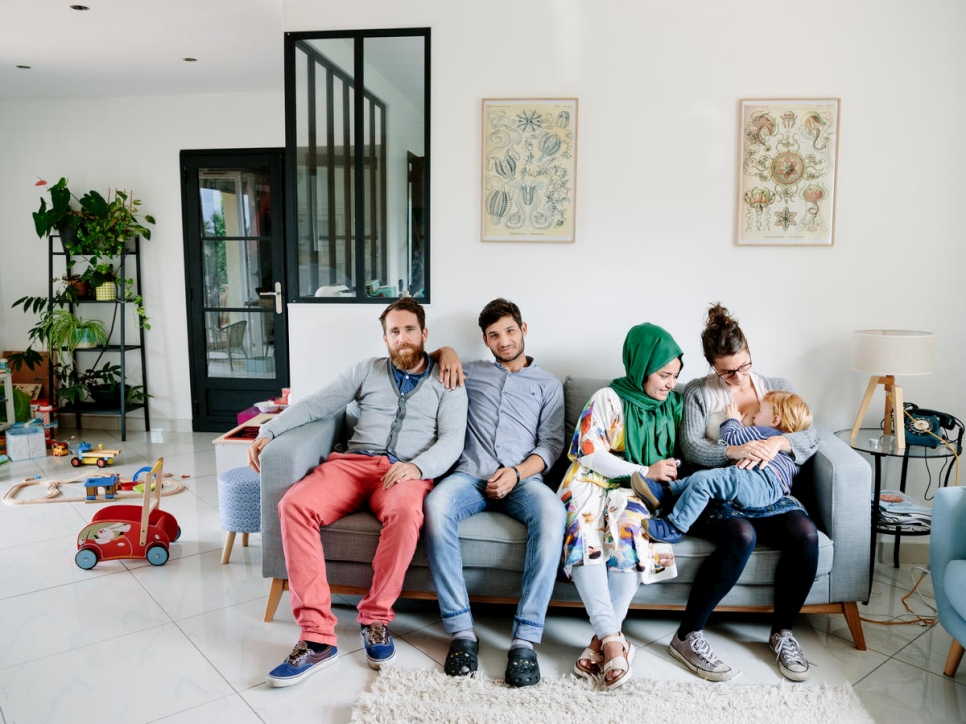Afghan couple are like second parents to French hosts' toddler
Anaïs and Vincent, with their baby son César, left Paris for a new life in the country. There, they found they had room to take in a refugee couple.

Anaïs, Vincent, and their son César, host Afghan refugees Zulfeqar and Battarine in Saint-Priest. The Afghan couple are like second parents to the French toddler. © UNHCR/Aubrey Wade
SAINT-PRIEST, France – Sitting around a table in their garden on a warm day, Anaïs and Vincent, parents of two-year-old César and former residents of Paris, recall the time they first heard about refugees in the news.
“We were still living in Paris and we felt powerless, although we wanted to do something,” says Anaïs. “When we had César, we had outgrown our Parisian little apartment and weren’t in a position to put anyone up.”
In early 2016, the couple moved to the charming village of Saint-Priest a few kilometres from Lyon, which has given them a more comfortable lifestyle and room to take in a refugee couple from Afghanistan.
“Here, we had a spare room and we thought it would be a good time to give it a go.”
After settling in and having a few renovations done to the house, they met an Afghan refugee couple, Battarine and Zulfeqar through the organization SINGA, which helps integrate refugees in France. The couple came to their house and, with the help of a translator, they chatted.
Zulfeqar and Battarine fled Afghanistan, where their families were persecuted by the Taliban. They first went to Iran, but living conditions in Tehran were difficult. “My mother and I slept in the streets for five years,” says Battarine.
Then in 2015, Zulfeqar arrived in Iran and, together, they decided to leave.
“We walked all night through the mountains. We were scared that the police would catch us, so we crossed the border and stayed in Turkey for a month. In Izmir, we slept in the fields in the rain. Then we went to Greece, Hungary, and eventually France”.
"When Zulfeqar and Battarine come home he goes crazy, clinging on to their legs and refusing to let go!"
When they arrived, Zulfeqar and Battarine thought their troubles were over, but they could not find anywhere to live. For several months they alternated between sleeping on the streets and emergency shelters.
“One day, a lady at French class asked us where we were sleeping, then she called some friends. We stayed with one lady for a week, then with other people for a week.
“When we came here, it was nice. Anaïs and Vincent are very good to us and things are going well.”
The couple have their own room in the basement. “They are very independent and we think of them as housemates,” says Vincent with a smile. “That doesn’t stop us having an enjoyable time together. César has also strengthened the bond between us. He adores them and spends a lot of time with them. When Zulfeqar and Battarine come home he goes crazy, clinging on to their legs and refusing to let go!”
The affection is clearly mutual. A motherly Battarine has the toddler sitting on her knee throughout the conversation.
Her thoughts turn to the future: “When we have found jobs and a house, I will try to bring over my mother, who is in Iran by herself.”
Zulfeqar and Battarine are looking for more permanent accommodation, and Vincent and Anaïs are doing all they can to help, although the couple’s departure will leave a big hole in their lives and their hearts, “especially for César. They are like second parents to him and it will be difficult to see them leave.”
This story is part of the French chapter of No Stranger Place, developed and photographed by Aubrey Wade in partnership with UNHCR, profiling refugees and their hosts across Europe. The exhibition will go on display at Ground Control in Paris, on 20 June 2018.
